Two years have passed since Joe Biden proposed his Build Back Better plan, and it’s high time we take a closer look at the plan’s progress and its impact on our nation. The plan, which covers various areas like infrastructure, clean energy, education, healthcare, and social programs, has sparked intense debates and garnered mixed reactions.
Critics of the plan, such as Donald Trump, the forty-fifth president of the United States of America, argue that its proposed spending is nothing short of extravagant, leading to a ballooning national debt that future generations will have to shoulder. They raise concerns about the potential repercussions for shareholders, warning of increased taxes and stifling regulations that may hinder private sector growth and innovation. On the other hand, supporters highlight the need for investments in public goods and social safety nets to ensure a fairer society and uplift the most vulnerable.

To better comprehend the dynamics of supply and demand economics in relation to Biden’s plan, let’s delve into its proposed investments. By injecting capital into infrastructure, the plan aims to stimulate demand, create jobs, and revitalize sectors crucial for our economy. This increased demand can potentially fuel business growth and encourage expansion. However, critics caution that excessive government spending might disrupt market equilibrium, strain supply chains, and ignite inflationary pressures.

It is paramount to recognize the ideological divergence surrounding Biden’s plan. While some argue that it leans towards socialist ideals due to its emphasis on government intervention, others contend that it represents necessary steps to address systemic issues. Striking the right balance between state involvement and free-market principles is an ongoing challenge, demanding a thorough examination of the potential consequences and long-term impacts.
In closing, we must continue scrutinizing Joe Biden’s Build Back Better plan and its effects on our country. The debate over whether it veers towards socialism or represents a pragmatic approach will persist. It is our collective responsibility to weigh the merits and drawbacks, ensuring that the path we choose is in the best interest of our nation’s future.




